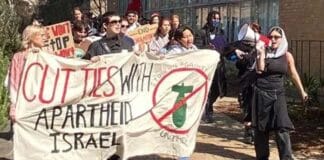The victory of Grassroots in the Sydney University Student Representative Council (SRC) elections in September was undoubtedly a win for the Left. A coalition, including Solidarity students, built around Grassroots won around 60 per cent of the votes on an explicitly left-wing, activist platform; on issues including refugee rights, defending women’s refuges, the environment, fighting fee deregulation, and the need for a fighting student campaign.
However, there are worrying signs that the chance to translate the election win into building the activism that can take the fight to uni management and Abbott in 2015 is being undermined by the bureaucratic attraction of wheeling and dealing for office-bearer positions. The fascination with SRC internal structures is already a pull.
The failure to build active, inclusive and political Education Action Groups on campuses across the country meant the student movement did not reach its potential to challenge Abbott and the education cuts this year. That was clear at Sydney University.
But there has, so far, been too little discussion within Grassroots (GR), as a whole, about how to translate the election victory into a stronger student movement. The traditional SRC horse-trading over office-bearer positions has produced some concerning results.
During discussions about pre-selecting SRC office-bearers, it became apparent that, unbeknown to the majority of students involved in the GR campaign, a small group of Grassroots members had agreed to divide up the office-bearer positions. These deals had been sown up by a small group of Grassroots members with former Sydney Labor Students and various independents, in return for them campaigning for the GR ticket.
One consequence was that only Grassroots members were able to vote to pre-select a number of key positions. Discussions and meetings around these decisions were also restricted to Grassroots members, meaning other activists were locked out of any discussion over the make-up of the SRC for which they had campaigned. It remains unclear exactly how this was democratically decided within Grassroots itself. Worryingly, the move to exclude activists from the discussions was justified by claiming members of Grassroots would be somehow “unsafe” if other, still unnamed, activists were allowed to take part in meetings. This entirely unsubstantiated accusation was bureaucratically used to control who could, and could not, participate and voice their opinions.
The result of this process was that Solidarity’s candidate, who had been central to the campaign against Abbott’s budget all year, arguing to build a fighting campaign to draw new students into the movement, narrowly lost the pre-selection vote. The Education Officer position, an activist position responsible for coordinating the Education Action Group (EAG), instead, went to two Grassroots members who had not been as involved. This was a triumph of bureaucracy over politics, and no way to ensure the EAG (or the SRC) gets off to the vibrant start that is needed.
Autonomous organising
These moves shocked quite a number of people in, and around, Grassroots. However, in a particularly concerning turn of events, the large minority of GR members who voiced support for Solidarity’s activist candidate were labeled “racists” in an effort to discredit their arguments and shut down discussion.
The accusation of racism sprang from another political disagreement over “autonomous organising”, something that needs more discussion.
Some Grassroots members are committed to the Autonomous Collective Against Racism (ACAR), which was formed on the basis of autonomous organising principles, meaning that only “people of colour” can be members. This, in turn, is based on the idea that only those who experience racism can know how to fight it. The Anti-Racism Collective (ARC), however, operates on the principle of involving and uniting all those who want to fight racism, and to fight particularly against the essential sources of institutional racism like the government and its racist refugee policy, and the media.
The unfounded accusation of racism against GR members who support the ARC only served to stifle discussion and orchestrate the vote. As other students pointed out, no one in Grassroots had a problem with allowing the supposedly “racist” members of ARC to campaign for the ticket during the elections. An active anti-racist collective at Sydney University will be needed as much as ever in 2015, and we need an open discussion about how best to build it.
Hundreds of students voted for GR because they wanted a left-wing activist university. The experience of Socialist Alternative and Labor students attempting to bureaucratically control the EAG was a central driving force for students to build the GR election campaign and challenge for control of the SRC. We shouldn’t squander the lessons of the past year.
What is needed now is a strategy of politically engaging and mobilising students, on and off campus, to build a movement strong enough to confront Pyne’s attacks on education and the Abbott government’s agenda in 2015.
By Caitlin Doyle-Markwick





